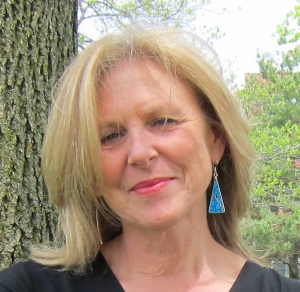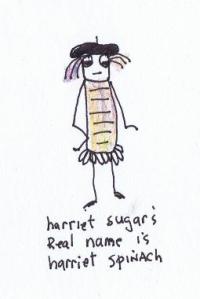 To contact us, Leave a Reply below.
To contact us, Leave a Reply below.
A writer, researcher, broadcaster and producer, Harriet Sugar Miller has been a freelance health journalist in Montreal and a cancer survivor for three decades. Prior to that, she practiced law with the Coudert Brothers firm in New York City.
She blogs about food, plant food primarily–for Zester Daily , Huff Post and The Anti-Cancer Club, which calls her a top expert on nutrition and cancer– and recently launched a health column, “Under the Microscope,” for the American Institute for Cancer Research. Trained by the CBC, Canada’s public TV network, she broke the trans fat story on national television in the early 90s–and for several years, wrote, produced and hosted a health show for the PBS TV station in upstate New York.
Harriet spent her formative years in Blue Heaven (aka Chapel Hill, NC) and hangs out online in several provocative health forums.
Click here for her short demo tape.
Follow her on Twitter.
Visit Glowing Older® for lifestyle tips
Join the diet and cancer discussion on Facebook.
Check out Plantastic Kitchen’s® debut on you tube: The Hairy Secret to Peeling Onions. Book and website launching soon.


Loved your blog!! Interestingly, I eat and have always eaten lots of onions, capers, berries, garlic, ginger, tumeric etc…of course, if you also add the years when I ate burgers, and all things fried they probably cancel out all the good nutrients. I do believe in nutrition coupled with traditional treatments. love you. E
LikeLike
Very interesting blog, as useful for prevention as for disease management.
Anne Lewis
LikeLike
Thanks for sharing the tips. Very useful!
LikeLike
I just recently joined your blog because my 12 year old was diagnosed with cancer. Today I read the article “Salmon Says”.Could you look into how clean and safe smaller fish like herring and sardines are. We eat those for our omegas because they are small and lower on the food chain. We hope they are cleaner than the big fish. Thank you
LikeLike
Yes, sardines and herring and anchovies are also good sources of omega 3 fatty acids but the cleanliness of those wild fish would depend on where they’ve been living. Herring from the Baltic, for example, are likely to be more contaminated than sockeye or pink salmon from Alaska (which also feed fairly low on the chain) because the Baltic is polluted. At this point, salmon from Alaska are not showing signs of Fukushima radiation, but that situation could change. The waters off Chile and Peru are among the world’s cleanest, but I have no idea how to purchase wild fish from there. Does anybody know how? Is anybody interested in starting a business selling South American sardines?
LikeLike
Anchovies from off the coast of Peru are now available! Those waters are among the world’s cleanest. Look for the name “Engraulis ringens” Wild Planet brands is selling them. http://www.wildplanetfoods.com/product/white-anchovies-in-water/
LikeLike
i don’t eat salmon as often as i ”should” (cooking inside the smell of fish lingers)…but i do get my daily supplement of omega 3s from a pharmaceutical grade of oil under ‘ascenta’…sold at whole foods and other stores. what is your op of this approach?
http://www.ascentahealth.com/
LikeLike
Fish oil supplements of omega 3s are a good substitute. Just make sure you’re buying a purified brand. For those who don’t want fish, you can also purchase micro-algae supplements.
LikeLike
Hi Harriet,
Have you ever thought of sharing some of these recipes on Recipes.ca? It would be a great way to reach more people – you could link your recipes right back to your website. It’s completely free and only takes a few minutes to sign up! Hope to see you join!
Maria
LikeLike
Hi Harriet, I’ve nominated you for the One Lovely Blog Award. There’s no obligation to accept or re-post it, this is just my way of saying ‘I enjoy reading your posts and love the work you’re doing here’.
The award post link: http://perisspiceladle.com/2013/01/16/blog-of-the-year-2012-and-more-a-heartfelt-thank-you/
Have a great year!
Peri.
LikeLike
Dear Harriet,
Thank you for the information you gives. Since 2000, when my mum became ill, it has been the hottest subject for me. She had a lung cancer. I’ve just started to create my own blog dedicated to the same topic – the healthy diet to fight and prevent cancer but in Russian. Could you please give me your permeation to use information from your site on mine (certainly, with links to your site)? Thank you in advance and all the best wishes to you.
LikeLike
Prior to April 2011 I would have appreciated the article on salmon’s various sources & BPA-free cans, etc. Doesn’t matter now, however, since the entire Pacific is awash in radiation from the damaged (& still unrepaired) Fukushima nuclear plant. Everyone knows it, but most of us seem to be in denial.
LikeLike
Spring 2014 –and the tests on Alaska’s salmon are still coming up clean. We are now entering the critical time period when those currents carrying Fukushima radiation may be reaching Alaska. I’m following the story.
LikeLike
how important is it to eat raw beets vs cooking them?
LikeLike
According to nutritiondata.com, cooked beets have more betaine than raw beets. Betaine is a nutrient that helps control methylation of our genes, a process that’s key to DNA synthesis and repair. Dr. Oz, however, suggested that beets should be eaten raw in order to reap their cardiovascular benefits. I think the key with many of these vegetables is to eat some raw and some cooked. Certain nutrients in plants appear to be activated by heat (lycopene, for sure, maybe quercetin, for example) while others are killed by heat (e.g., the enzymes that turn alliums and crucifers into cancer-fighters), and scientists have not yet answered all those questions. Until then, you can hedge your bets by seeking variety.
LikeLike
I should add one more qualification: Whenever you do cook beets (or any other vegetable), keep the cooking time short. A quick steam, saute, or steam-saute is best. If you buy small beets and quarter them, they should take about 15 minutes max to steam.
LikeLike
Hi Harriet,
Enjoy your blog. I am a 10 year cancer survivor in California. I follow a plant based diet and actually teach plant based cooking classes. I am reading about Turkey Tail Mushrooms and just bought some supplements from Defense Host. They are having studies done on them now in regards to boosting the immunity of people going through chemo. I thought that it may be good to boost my immunity as well, even thought I went through chemo 10 years ago. Have you heard of this? I am always trying new things, as I continually work to try and prevent my cancer from returning. Sandy
LikeLike
Yes, Turkey Tail mushrooms appear promising. As with most foods, science has yet to figure out the optimal dosages. Thanks for the suggestion, Sandy.
LikeLike
Pingback: Celery Lima Bean Salad – Smart Food
Harriet – as an MD (onco-immunologist) I am delighted at the education you are offering. Bravo!
LikeLike
Hi Harriet, I’m AJ Earley. I am a personal chef from Boise, Idaho and I absolutely love your blog! It’s come in very handy for me, especially when helping out clients suffering from various forms of cancer. I’ve accrued some healthy, cancer-fighting recipes over the years and I would love to share a few of them in a guest post on your blog. Let me know what you think, and I look forward to hearing from you!
AJ Earley
LikeLike
Send me a recipe or three, and we’ll discuss, AJ.
LikeLike
The info you are imparting to otheres is a very useful work to society.
I was planning to start low carb, low protien and hgh fa diet for a friend with bladder cancer. You have mentioned in one place that fat can aggravate some slow cancers. So do you think the Ketoginic diet is not right for him?
Your reply will be very much appreciated.
Prabha
LikeLike
Unfortunately, I really can’t answer your question. The research on fatty acids and cancer is quite preliminary. If I were your friend, I would focus on eating vegetables–especially alliums and crucifers–and herbs and spices and berries and limit carbohydrates and even protein. As for fats, I’d stick to plant fats–legumes, avocado (Haas, the ones with black, bumpy skins), extra virgin olive oil. Limit nuts/seeds to a handful /day–and emphasize chia. As for grains, buckwheat is a good choice. High quality green tea is also important. Check out my newest posts–a three part series summarizing the latest research on anti-cancer diets. I’ll be releasing Parts 2 and 3 over the next couple of weeks.
LikeLike
I have not received a post from you in months and months. I just tried to subscribe again and got message back I am already subscribed.
LikeLike
Sheila,
Did you get the Dec. 31 post? It’s the first post I’ve written in a long while (as I’ve been trying to finish up writing a book).
Let me know.
LikeLike
Hi, I’m Paul. Love your website. I will leave my details below. Stay safe. Stand strong. 🙂 Paul
LikeLike
Hello, this blog can truly be life-saving. I commend you for your dedication to humanity. I’ve been battling Stage 4 gastric cancer since Sept ’12, and it’s sites like yours that keep me going. I would like to share an article I just read regarding how university researchers have developed dietary cancer prevention strategies related to (cancer) stem cells. It’s an interesting read that you might want to share in your blog. http://today.agrilife.org/2016/06/01/texas-am-agrilife-researchers-develop-dietary-cancer-prevention-strategies-related-to-stem-cells/
Thank you and keep up the good fight.
LikeLike
Could you please create a post outlining a daily and weekly meal plan. I very much appreciate your detailed and informative blog.
LikeLiked by 1 person
Hi Harriet
I lost your email contact. I would like to get in touch with you
Suhasini Modem, Cancer researcher from Wayne State University
LikeLike
Did you get my email? Please contact me at hsugarmill@gmail.com.
LikeLike
Pingback: Ah Men: Just for You | Eat and Beat Cancer
Pingback: Red Onion Soup with Cheese Toasts - Market Cooking - jittery cook
Pingback: #AICR19 Takeaway: Change Your Metabolism | Eat and Beat Cancer
Hello Harriet,
I am really fascinated by your story starting out as an attorney and the research you have done on food and cancer. I wanted to know if you have time for an informational interview. I am a young attorney and really interested in starting a website based on female wellness and wanted to learn a bit more about what you are doing in the space.
Thank you,
Corinna
LikeLike
Hi, Corinna,
Thanks for reaching out. I’d be happy to talk with you. Send me an email, and we’ll set up a time. –Harriet hsugarmill@gmail.com
LikeLike